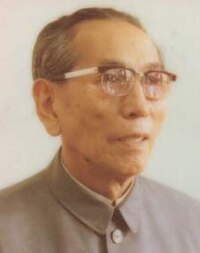Ngapoi Ngawang Jigme
| Ngapoi Ngawang Jigme | |
|---|---|
| ང་ཕོད་ངག་དབང་འཇིགས་མེད་ 阿沛·阿旺晋美 |
|
 |
|
| Chairman of Tibet Autonomous Region | |
|
In office 1964–1968 |
|
| Preceded by | Choekyi Gyaltsen |
| Succeeded by | Zeng Yongya |
| Personal details | |
| Born |
February 1, 1910 Lhasa, Tibet, Qing empire |
| Died | December 23, 2009 (aged 99) Beijing, People's Republic of China |
| Spouse(s) | Ngapoi Cedain Zhoigar |
| Awards |
|
Ngapoi Ngawang Jigme (Tibetan: ང་ཕོད་ངག་དབང་འཇིགས་མེད་, Wylie: nga-phod ngag-dbang 'jigs-med, ZYPY: Ngapo Ngawang Jigmê, Lhasa dialect IPA: ŋɑ̀pø̂ː ŋɑ̀wɑŋ t͡ɕíʔmi; Chinese: 阿沛·阿旺晋美; pinyin: Āpèi Āwàng Jìnměi; February 1, 1910 – December 23, 2009) was a Tibetan senior official who assumed various military and political responsibilities both before and after 1951. He is often known simply as Ngapo in English sources.
Ngapoi Ngawang Jigme was born in Lhasa as the son of a leading Tibetan family descended from former kings of Tibet, the Horkhang. His father was governor of Chamdo in Eastern Tibet and commander of the Tibetan armed forces. After studying traditional Tibetan literature, he went to Britain for further education. He was married to Ngapoi Cedain Zhoigar, Vice President of the Tibetan Women's Federation, hence his name Ngapoi.
Upon returning in 1932 from his studies in Britain, he served in the Tibetan army. Ngapoi began his career as a local official in Chamdo in 1936. As a cabinet member of the former government of Tibet under the Dalai Lama, he advocated reform. In April 1950 he was appointed governor-general (commissioner) of Chamdo, but took office only in September, after the previous governor, Lhalu, had left for Lhasa.
While serving as governor-general of Chamdo, he also became commander-in-chief of the Tibetan armed forces.
...
Wikipedia
